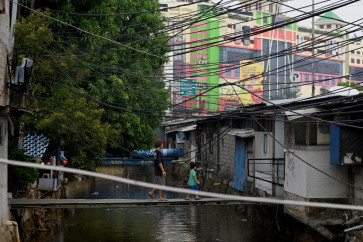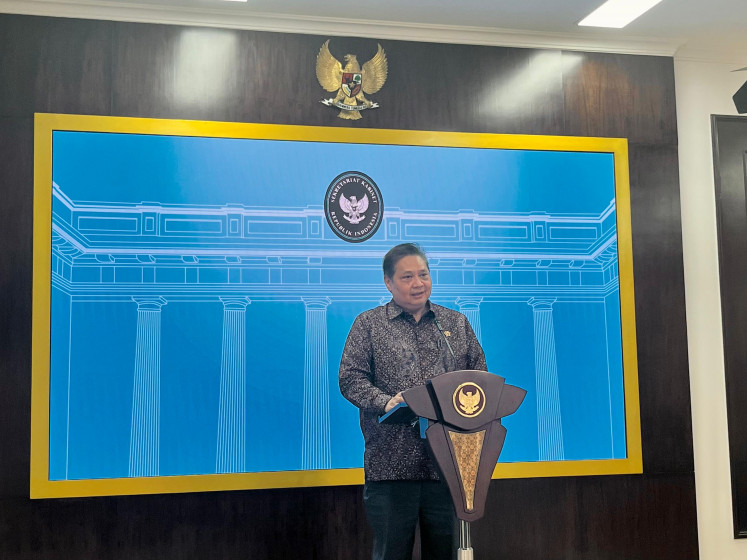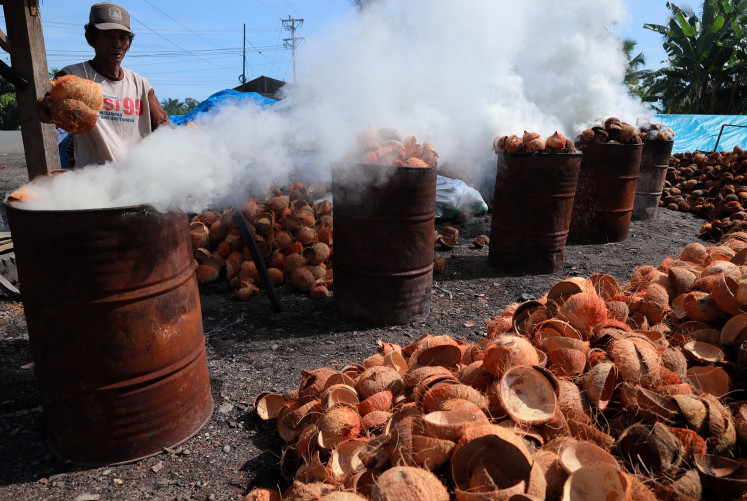Can Indonesian youth win the “David Vs. Goliath” fight against "Big Tobacco"?
A growing number of organizations led by young Indonesians are taking tobacco companies to task. But it has not been an easy fight.
Change text size
Gift Premium Articles
to Anyone
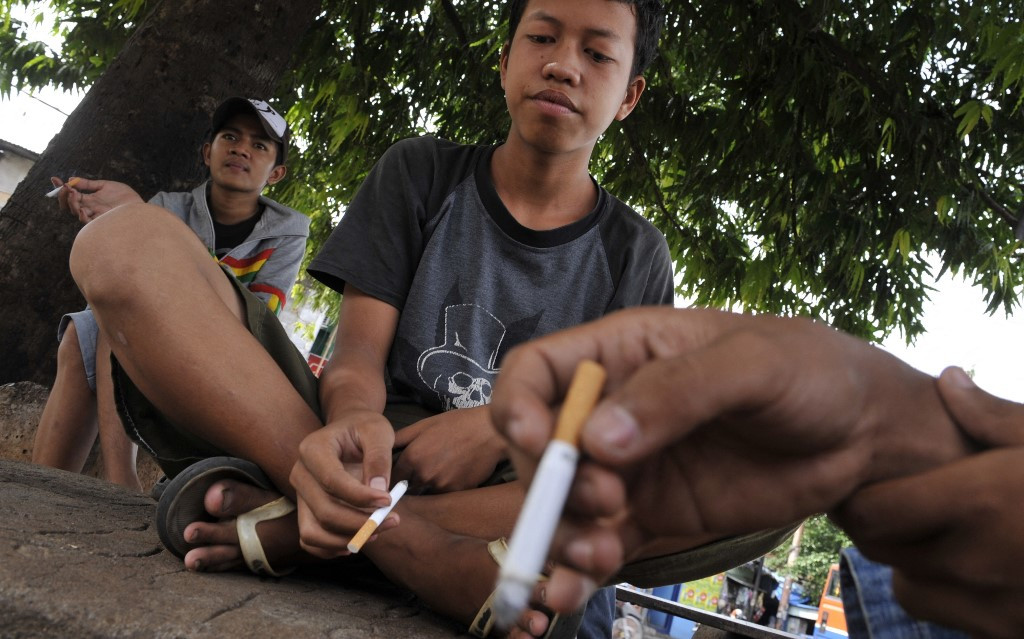
A growing number of organizations led by young Indonesians are taking tobacco companies to task. But it has not been an easy fight.
For many young Indonesians, their first encounter with cigarette smoking is something of a fork in the road.
As a teen, Margianta Surahman J. Dinata (Gian) was frequently bullied and called bencong (a disparaging term used to refer to men with supposedly feminine traits), ayam (chicken) and other insults.
The 27-year-old also suffered from physical harassment — all because he refused to smoke cigarettes like his peers. For him, it was a big part of why he never belonged to “the boys club” who saw smoking as a manly endeavor.
Gian is today the CEO of youth-based group Emancipate Indonesia, an NGO which focuses on modern slavery and young workers' welfare.
For anti-tobacco activist Ucu Saepur Ridwan, smoking was a childhood addiction that required drastic events to let go of.
“I started smoking kretek [clove cigarettes] when I was a junior high school student in my home town in Pangandaran, West Java. I used to smoke two packs of cigarettes every day, until I fell ill and decided to quit 11 years ago,” the 28-year old said.
Socially acceptable
In the majority of Indonesian ethnic groups, smoking is a socially acceptable activity for youth and adults alike. Children smoking along with adults are not a unique sight in parts of society.
In his study entitled The Smoking Problem in Indonesia, Tjandra Yoga Aditama, a medical professor at the University of Indonesia, said that in Indonesia, especially in rural areas, cigarettes are usually offered during social meetings and occasionally as a sign of friendship.
“Another cultural aspect is being polite and not rejecting a host’s offer, which is considered impolite and may offend them,” added Aditama, who was also director of the World Health Organization (WHO)’s South and Southeast Asia regions.
Ridwan added that smoking was viewed as an “achievement” for youngsters.
“When we completed our 30 days of fasting during the Ramadan month, our parents would give us a pack of cigarettes as a gift to celebrate the Idul Fitri holiday.”
Perhaps it is why, to some, Indonesia is remembered as the “smoking baby country”, after an internet meme of an Indonesian toddler casually smoking went viral a few years ago.
That moniker is not too far off with 3.2 million active child smokers or 9.1 percent of the country’s 63 million smokers (based on the Health Ministry’s basic health research 2018). This is among the highest smoking prevalence rates in the world.
Gian is currently one of the proponents of national and global youth initiatives, Say No to Smoking and Tobacco.
“While the tobacco industries have been targeting us, we do the reverse.”
“Our message to Indonesian youth is that smoking is not cool and it is unhealthy. Tobacco industries spread big lies, targeting us. Smoking affects your health and destroys the environment,” he said.
Indonesia’s 2009 Law No. 40 on youth defines “young” as citizens between ages 18-30. “But, many of our members [anti-tobacco activists and anti-tobacco ambassadors] are junior and high-school students aged between 13-18 years [generation Z],” explained Gian.
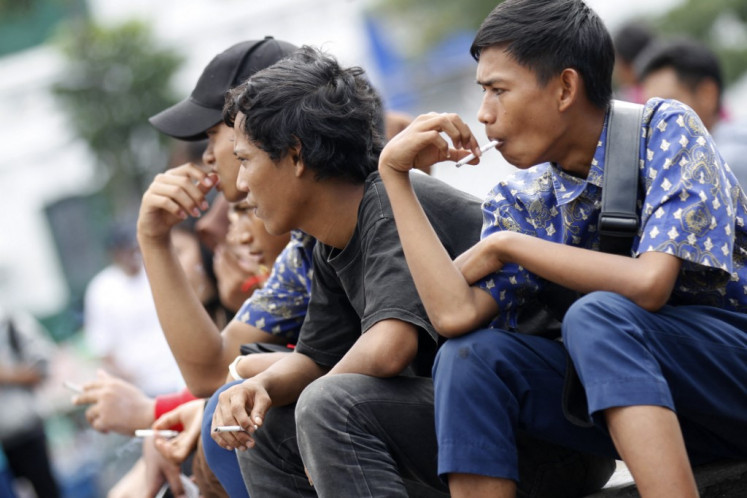
Smoking awareness martyr
The story of Robby Indra Wahyuda is both heart-wrenching and inspiring. He started smoking when he was 14 years old and was diagnosed with larynx cancer in 2014. He died a year later at the age of 27 in 2015.
His parents were furious when he posted his struggle with cancer on his Facebook account, saying it was a family issue. But Robby had a mission — discouraging other young Indonesians from taking up cigarettes.
“We are hoping Robby’s story can inspire young people to stay away from smoking and to encourage smokers to quit, so that no parents will bear such a devastating pain as losing their son or daughter,” explained Elansyah, Robby’s father, during the launching of anti-tobacco and anti-smoking advertising by the Health Ministry.
In the same year in 2015, around 60 Indonesians aged 16-30 established Gerakan Muda FCTC Indonesia (Indonesian FCTC Youth Movement), which launched massive offline and digital campaigns through its social media accounts and website fctcuntukindonesia.org.
Before his passing, with supports from Gerakan Muda FCTC, Goodlife Society and Smoke Free Agents, Robby launched a petition through Change.org, obtaining 30,387 supports to ask President Joko “Jokowi” Widodo to access, sign and ratify WHO’s Framework Convention on Tobacco Control (FCTC), a global instrument for tobacco control policies.
Selling to minors
Indonesia is the only country in Asia and the Pacific region and one of the seven countries in the world that has not ratified FCTC, meaning Indonesia still allows tobacco companies to sell products to minors, to install outdoor, printed, electronic and online advertisements as well as promotion and sponsorship.
Julio Adam Pratama, a member of Gerakan Muda FCTC from Banjarmasin, South Kalimantan, said during the National Youth Day Pledge: “By ratifying FCTC, the nation is present in protecting its youth from the hazardous impacts of tobacco use, but Jokowi was still in doubt.”
Gerakan Muda FCTC is now growing to embrace 102 organizations in 30 cities across Indonesia, conducting campaigns, advocacy and training for youth activists and community members.
They try to actively empower students to testify before policy and lawmakers to ban the use of tobacco at school and school-related sports and art events. They advocate mayors and regents as well as lawmakers to enforce stricter regulations and bylaws banning smoking in public spheres, indoor and outdoor advertisements as well as offline and online promotion.
“We are organizing parallel events, campaigns and advocacies at every level from Kampung community-based activities to district, provincial, national and even at international forums,” Julio said.
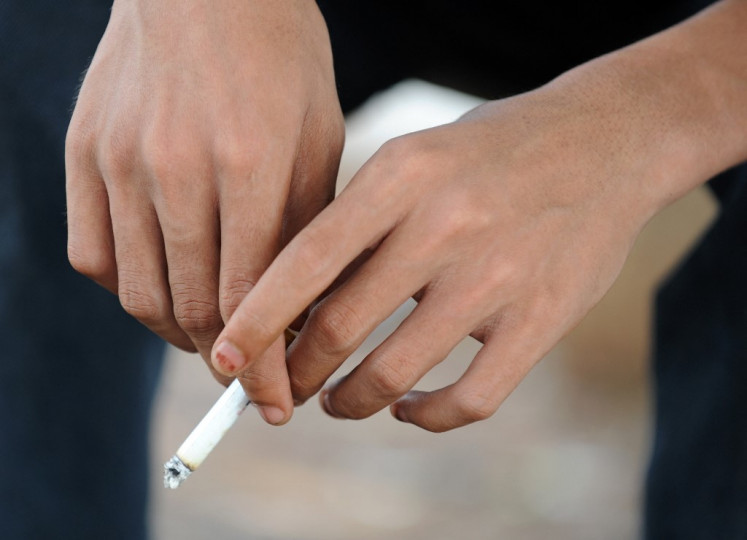
Abuse and Threats
In 2018, Gian and representatives from Indonesian youth actively participated in various international events including the 12th Asia-Pacific Conference on Tobacco Health (APACT) in Bali and One Young World Summit with 2,000 young leaders, in the Hague, the Netherlands.
Gian also spoke at a side event during the World Health Assembly in Geneva in 2019 sharing the experience of Indonesian youth participating in tobacco control campaigns and advocacies.
Together with Janitra Hapsari, president of Global No Cigarette Movement (9CM) Yogyakarta (Central Java), Julio, a video creator, composed and performed a rap song entitled “Stupid Little Stick”, which won them third place in the world rap song competition.
During the course of their activities, these young activists have been facing both physical and mental threats — offline and online — from pro-tobacco groups, with their powerful teams of buzzers, and even government officials and pundits.
“After I spoke at several international events, tobacco proponents here in Indonesia including influencers and pro-tobacco groups began accusing us as ‘foreign or Western agents,’ for promoting no smoking and no tobacco use among youth,” Gian said.
He added, “I have even received death threats, but those did not prevent me from speaking up.”
Janitra shared, “One day, we held a campaign ‘Challenge to Change,’ urging both young and adult people along Jl. Malioboro in Yogyakarta to replace their cigarettes with something healthier. Suddenly, we were surrounded by a group of preman [thugs] forcing us to leave the site, otherwise ‘something bad,’ might have happened to us.”
More recently, in 2020, 58 youth organizations reactivated #TolakJadiTarget (#Refusetobe a Target) using the theme,“Lindungi Anak dan Remaja dari Manipulasi Industri Rokok” (Protect Children and Youth from Cigarette Industry’s Manipulation).
Environmental campaigns
Other youth campaigns focused on the environmental consequences of littering cigarette butts.
Cigarette butts with filters are the most commonly littered item worldwide with 4.5 trillion thrown into the environment each year, frequently ending up on beaches and in the ocean.
A study by Jenna Jambeck from the University of Georgia in 2015 revealed Indonesia to be the second largest country after China polluting the ocean, with 187.2 million tons of cigarette butts and plastic waste, which are considered as B3 or toxic waste.
Cigarette butts are made of cellulose acetate, a man-made plastic material containing hundreds of toxic chemicals, which can take up to 10 years to completely degrade.
“We have a strong case to launch this campaign,” Gian said.
The #SatuPuntungSejutaMasalah (#OneCigaretteButtAMillionProblems) campaign involved 107 organizations and 1,000 young people collecting 250,000 cigarette butts in 28 cities. This campaign was held in many locations across the country.
The campaign urges district, provincial and state governments to make the tobacco industry pay for the mess they create.
Spirit of the young
In the era of Greta Thunberg’s global youth activism, the Indonesian youth anti-tobacco and anti-smoking campaigns against Big Tobacco is something that must be taken seriously.
The latest addition was the establishment of Indonesian Youth Council for Tobacco Control (IYCTC) in February 2021 representing 43 youth and community-based organizations from 20 cities. Its members consist of young people aged 16-30 years old.
Among the youth groups are Forum Anak (Children Forum) in 100 cities including Bogor, West Java; Banjarmasin, South Kalimantan; and Sawahlunto, West Sumatra. Emancipate Indonesia, Universitas Indonesia’s medical students’ association; Generasi Tanpa Rokok Lampung (Generation Without Cigarettes) (GETAR); Gerakan Muda Tolak Jadi Target (Youth Movement Against Becoming a Target); Girl, Peace and Security; Global No Cigarette Movement (9CM); Nahdlatul Ulama (NU)’s Students’ Association; Muhammadiyah Students’ Association; Gerakan Muda FCTC; Kisara(Return) Bali; IAKMI Youth Movement; Puan Muda (Young Lady) and many others.
“We represent thousands of youths in our cities. This is a big milestone for the youth-led no tobacco initiative, because this is the first time we have worked together in unison,” Gian said.
They admitted it would be hard work ahead. Tobacco industries are immensely powerful and wealthy. They said they were waging a David vs. Goliath battle.
Ni Putu Sri Pratiwi, 19, from Tabanan, Bali implores Indonesia’s youth to be aware that “they are the soft targets of the tobacco industry through advertisement”.
“I really hope the president takes immediate action,” says Renaldo Pratama, a youth activist from Sawahlunto in West Sumatra.
“We are just small waves in a large ocean, but we strongly believe in youth power. Indonesia was built by the spirit of young people. One day, we will become an unstoppable tsunami,” Gian added.


